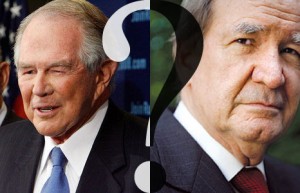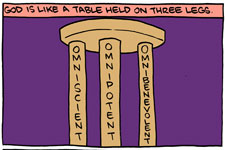 I have to admit, when I write about Pat Robertson or Pat Buchanan, I first have to check to make sure I have the right one. Which professional television blowhard is selling ignorant fundamentalism as intelligence this week?
I have to admit, when I write about Pat Robertson or Pat Buchanan, I first have to check to make sure I have the right one. Which professional television blowhard is selling ignorant fundamentalism as intelligence this week?
As it turns out, it is the sleepy-eyed host of the 700 Club, Robertson, who’s telling a midwesterner that God is not responsible for the tornadoes hitting the midwest. But worry not, beloved, for the victims could have prevented their plight it if they had prayed hard enough for God’s intercession.
No, really:
Yeah, that.
We’ve written about Pat Robertson before. This is clearly the next installment in Robertson’s crusade1 to stay media-relevant by campaigning for the position America’s Favorite Racist Grandpa, a position open since the passing of Strom Thurmond in 2003. And here lies a significant difference between me and Mike– Mike believes that Robertson is a man in his twilight years who’s reason and tact have been robbed from him by entropy.
I think Mike is too kind. Robertson is in the leadership of a multi-multi-million-dollar media empire, and while he might be the pope in his part of town, I find it very difficult to believe that he’s saying things that aren’t being vetted by a team of fellow travelers. Or rather, I should say that he might be suffering from dementia– but if he is, what he says suits the objectives of the Christian Broadcasting Network. All the while, The 700 Club remains popular with a large segment of Christians in the anglophone world. Everything that we said about Harold Camping last year applies to Pat Robertson, factor ten.
So, the flaws in Robertson’s hilariously pseudoscientific explanations may be clear, but let’s make fun of them for educational purposes for a minute or two:
(sarcasm mode engage)
First and foremost, the world we’re describing is created by the Evangelical Christian God. This is a God of infinite power, infinite empathy, infinite morality, and infinite knowledge.
But tornadoes in the midwest? That’s a purposeful situation that doesn’t even require the sympathy of Pat Robertson, let alone that of God. God put those tornadoes on the earth for a reason, and if you choose to live there, it’s your problem. Never mind that a lot of the God-ordained physical requirements for good agriculture are also good for God-ordained mesocyclone and tornado formation. If you don’t want to deal with tornadoes, don’t live there. But also, isn’t it great that God created a completely separate meteorological phenomenon, hurricanes, to take God-designed excess heat away from the God-designed Earth?
Again, never mind that the proximity to a coast is a necessity for the human civilization which God, contrary to evidence, constructed for us out of love. God decided that hurricanes are necessary, and if your family and livelihood are wiped out by the majesty of God’s creation, screw you.
However, if you can’t live in elusive four acres on God’s green Earth which are seismically and meteorologically stable and capable of agriculture, you’ll still be able to prevent hurricanes, earthquakes and tornadoes if you pray for God to intervene and change the system. But for God to agree to your request you must first indemnify God against any damages you may incur from his perfect system designed for you, out of love.
Sign here, please.
(sarcasm mode disengage)
No Christian is going to buy my sarcastic form here. The original, natural state is different, and I would even say that most believe this– even many self-described “liberal” Christians. The difference is not in the bill of goods, but in the wrapping paper.
And what is for sale here? Essentially, we’re talking about theodicy, a branch of apologetics that deals with how a loving God can exist in a world where “evil” exists. People who aren’t very versed in philosophy or who aren’t really interested in theology are more familiar with its English name, “The Problem of Good and Evil”2.
In my pre-activist days, I was aware of the word theodicy from my friends who were theologians, but my definition of it was “vague thing Christians care about” and later “vague thing Judeo-Christian types care about”. My slightly more informed understanding of it begins with another blogger: Baptist seminary graduate, journalist, and Left Behind destroyer Fred Clark3. Fred shares my love of footnotes, and explains theodicy like so:
That word “theodicy” is the one theologians use for the biggest question for which they haven’t got a credible answer: the problem of suffering and evil. Briefly, the universe is filled with pain, suffering, death and unrestrained evils. How can such a universe be reconciled with the idea of a Creator who is all-good, all-knowing and all-powerful?
It’s an interesting idea, and it’s especially interesting to atheists as it’s the very question which drives a lot, and I’d say the majority, of believers away from religion. Do keep in mind that it’s not why a lot of atheists stay away from religion– but as Fred points out, it is a big question, and I agree that there is no credible answer. If your job is to provide answers to all moral quandaries and everything else besides, that’ll quickly stick in the craw of someone who’s faith is starting to waver.
Outside of theology, and inside my own perspective, theodicy seems to be a process where a religion’s thinkers attempt to rectify different sets of syncretically obtained beliefs with each other and with the evolving and improving morality of that religion’s believers.
Okay, Sam, make it march: what does that actually mean to you? What do you think about God, good, and evil?
It means that this argument makes my eyes glaze over faster than when Mike talks about World War Hulk. It means that I think the whole thing is a cruel joke– a vestigial finger on the hand of humanity that magically picks our butts when we’re not looking. This is where Fred Clark and I part ways. Clearly, I work on a show called Ask an Atheist, so any god concept is right out. Even so, that leaves a lot of other stuff open to interpretation. Evil, for example: I don’t believe in it.
Now, before we go on, I should probably define evil. The definition I’m using for the word evil is in the noun form, especially when regarded as a supernatural force. There are people out there, who regardless of a god concept, talk about evil as if there’s a universal standard for what constitutes good actions and good people versus evil actions and evil people.
I don’t agree with that. So I’m a moral relativist, no real surprise there.
A good example of this lack of understanding comes from a friend of mine in Arizona, in a discussion about atheistic morality:
He: You don’t believe in *evil*?
Me: No, I don’t.
He: What about serial killers? Mass-murderers?
Me: Serial killers are sick. I believe in sickness. Mass murders believe they’re acting morally. It’s not like Pol Pot was going around acting like Snidely Whiplash.
He: What would you call it if my daughter was murdered?!
Me: Tragic. Terrible.
 That got his attention. I don’t believe in evil. But I do believe in bad, and I’m willing to go quite a ways to protect me, my family, and my friends from bad things. However, if the universe provides no evidence for a clear, universal standard of moral behavior, I think it is out of bounds for me to suggest that violating my own morality means that a person or an action has crossed over into the ranks of some supernatural Evil Adversary.
That got his attention. I don’t believe in evil. But I do believe in bad, and I’m willing to go quite a ways to protect me, my family, and my friends from bad things. However, if the universe provides no evidence for a clear, universal standard of moral behavior, I think it is out of bounds for me to suggest that violating my own morality means that a person or an action has crossed over into the ranks of some supernatural Evil Adversary.
But that wouldn’t prevent me from seeking justice for the violation of my morality that ends with a murdered daughter.
So is Pat Robertson evil? No. He is a sad man who tries to stay in our minds by alternating between provocative idiocy and obvious pandering.
1) Ha! I kill me!
2) And now I’ll get a philosopher and a couple theologians who tell me that theodicy has nothing to do with apologetics and that the ‘Problem of Good and Evil’ is not the best fit. Feel free to disagree with me in the comments.
3) This may be showing my hand too soon after the debate, but I think Fred Clark should be required reading for atheists who are looking to communicate with theists. He sort of provides a gold standard for the type of theist you should not piss off. And I say that in full knowledge that I may be failing here.
